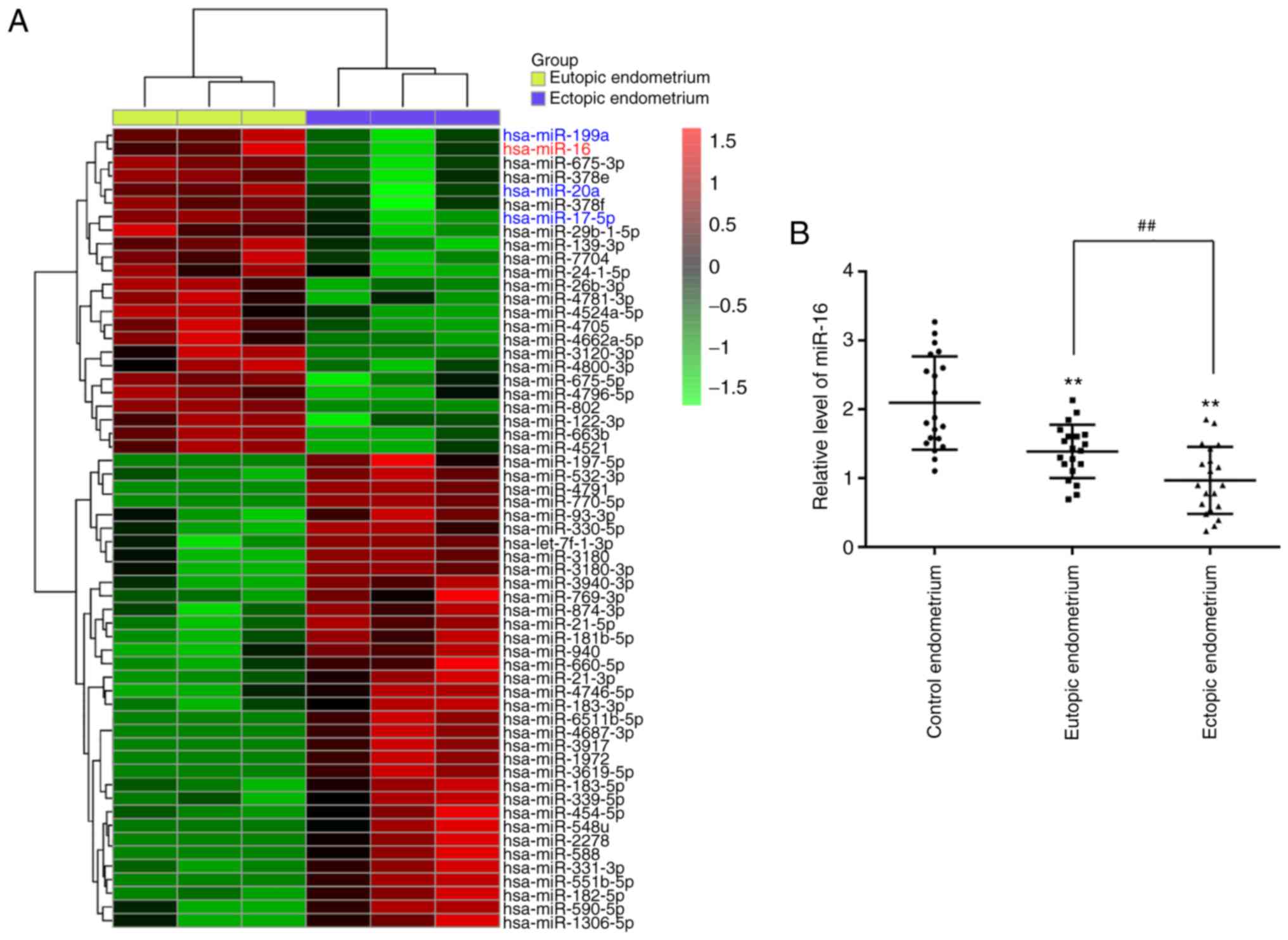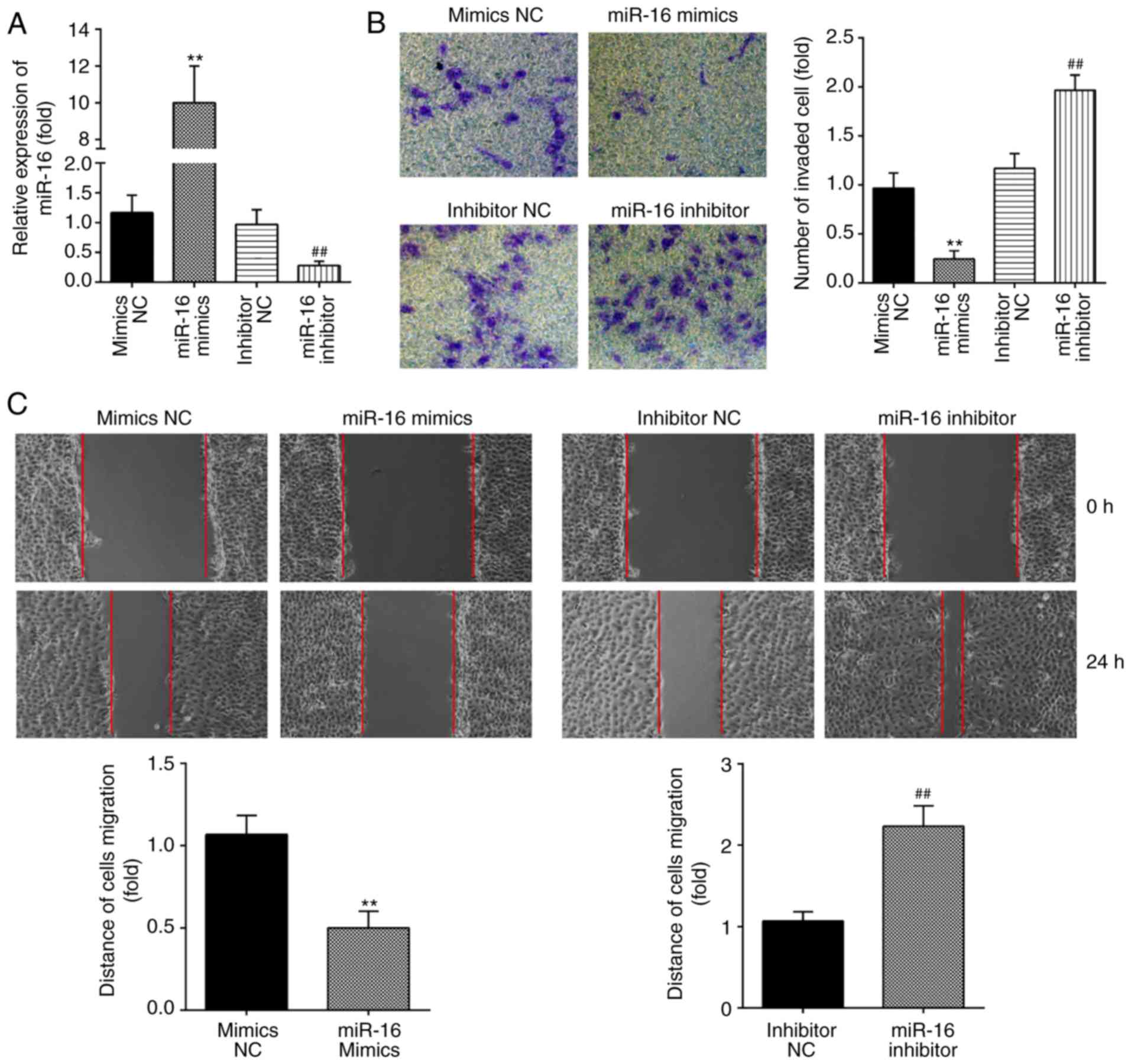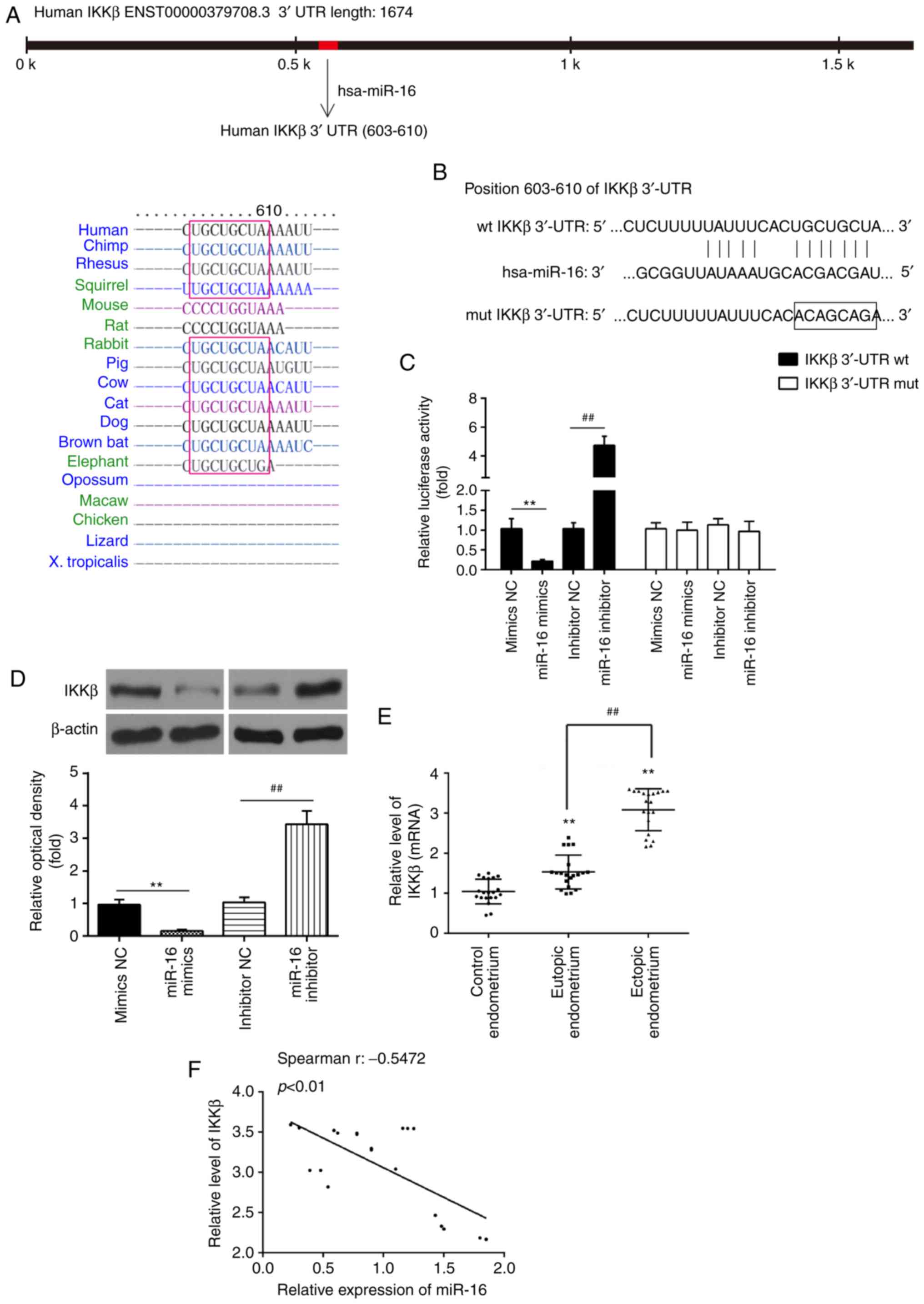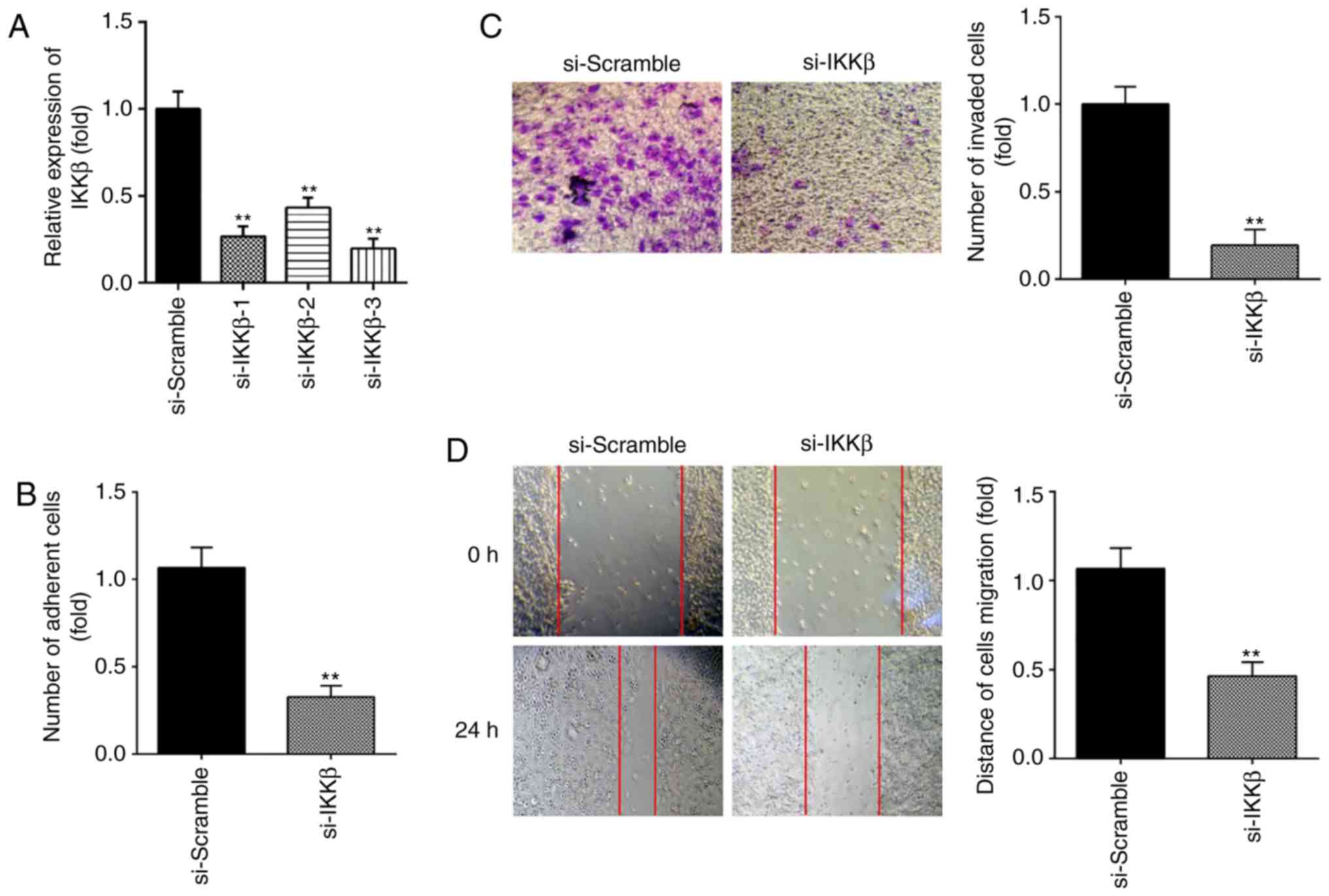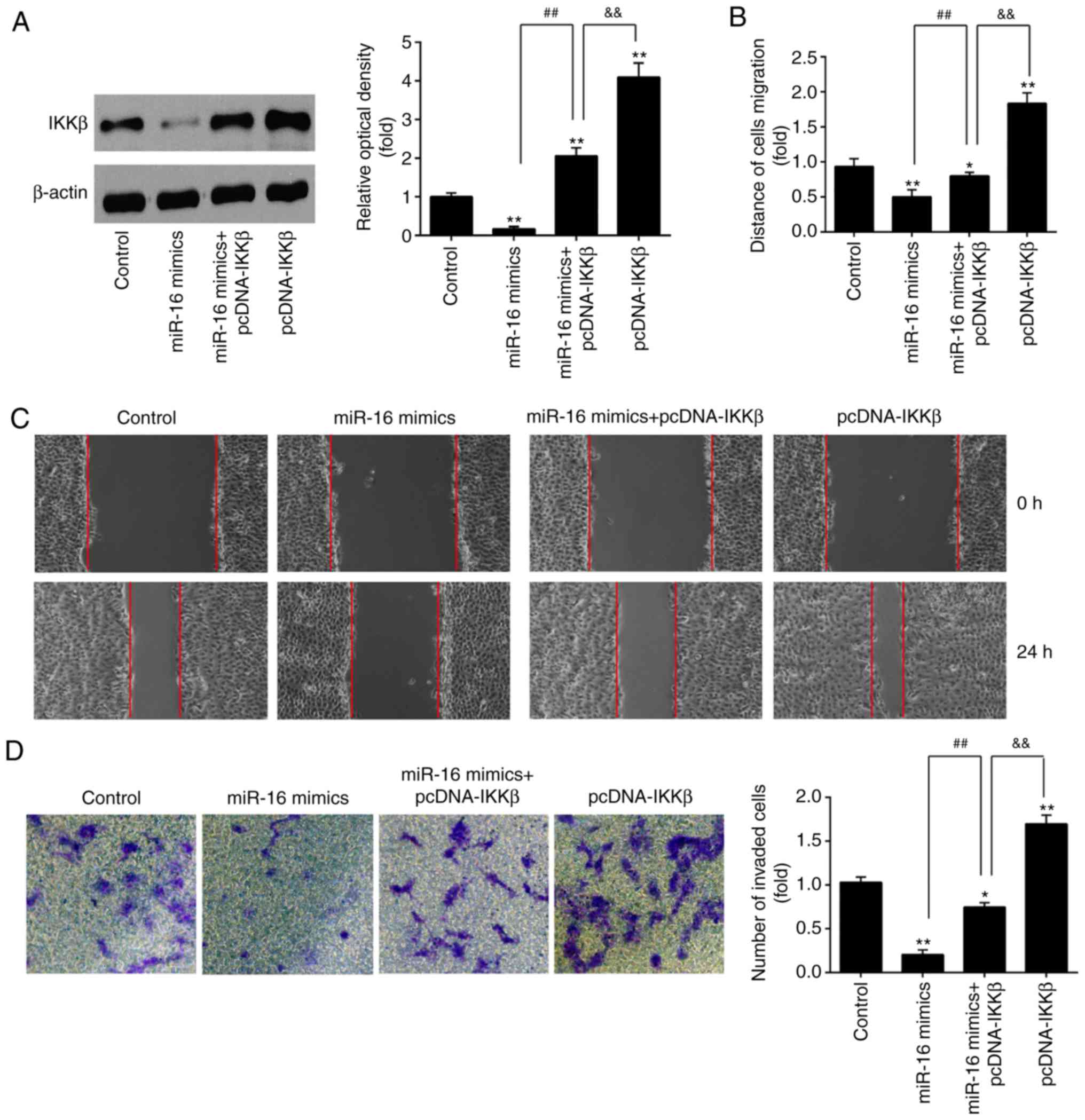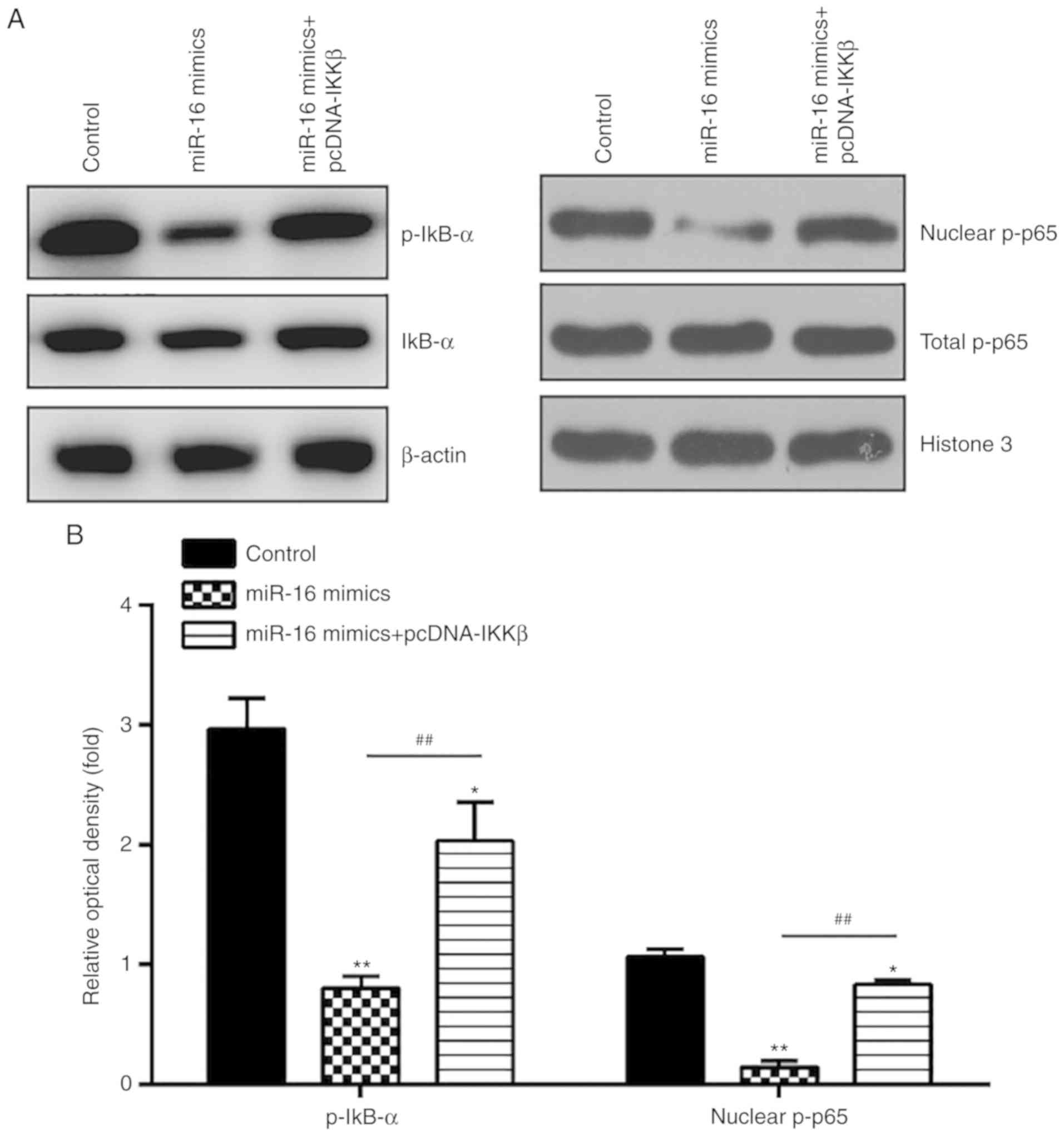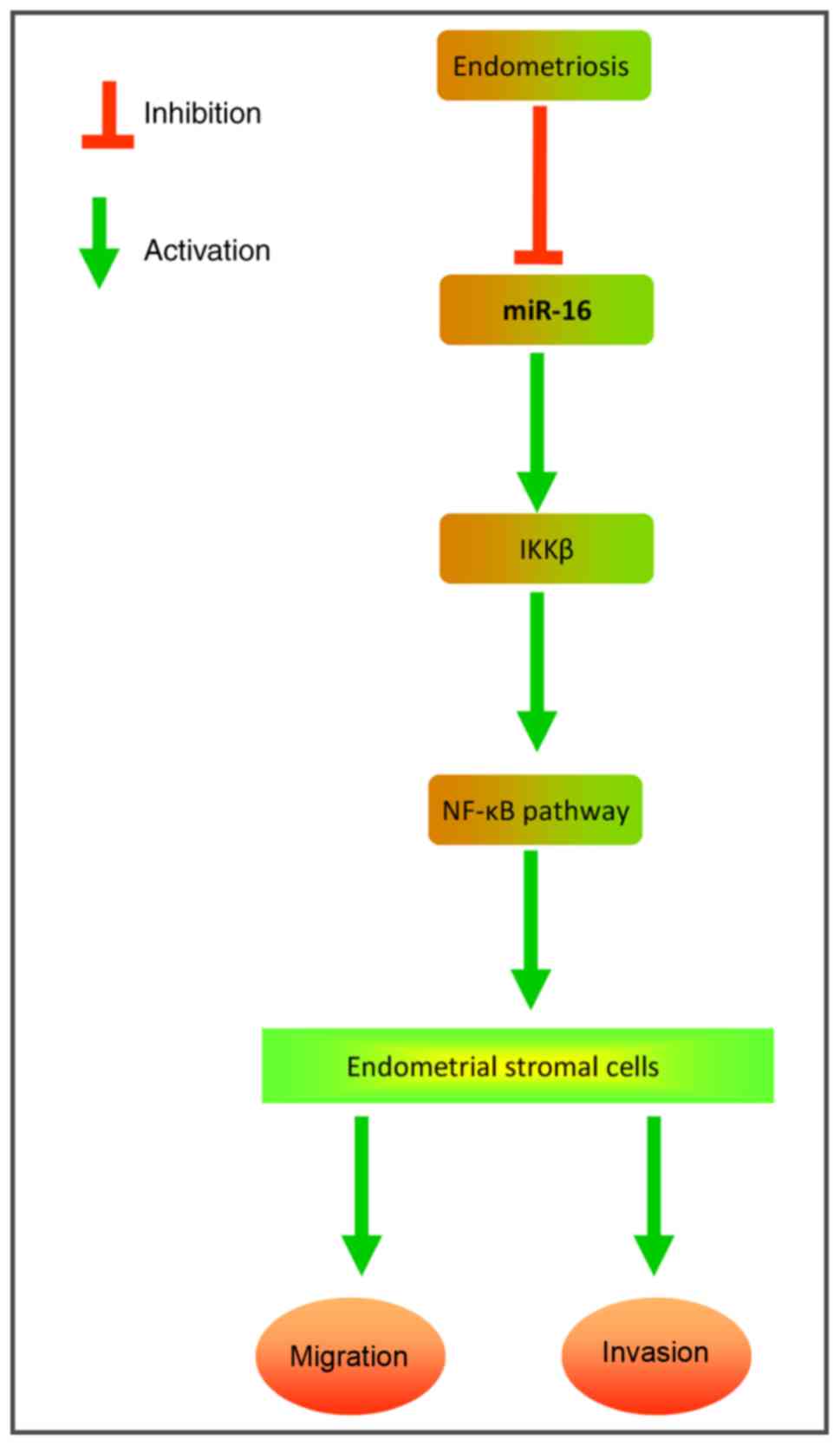|
1
|
Ponandai-Srinivasan S, Andersson KL,
Nister M, Saare M, Hassan HA, Varghese SJ, Peters M, Salumets A,
Gemzell-Danielsson K and Lalitkumar PGL: Aberrant expression of
genes associated with stemness and cancer in endometria and
endometrioma in a subset of women with endometriosis. Hum Reprod.
33:1924–1938. 2018. View Article : Google Scholar : PubMed/NCBI
|
|
2
|
Duffy JM, Arambage K, Correa FJ, Olive D,
Farquhar C, Garry R, Barlow DH and Jacobson TZ: Laparoscopic
surgery for endometriosis. Cochrane Database Syst Rev.
3:CD0110312014.
|
|
3
|
Vercellini P, Vigano P, Somigliana E and
Fedele L: Endometriosis: Pathogenesis and treatment. Nat Rev
Endocrinol. 10:261–275. 2014. View Article : Google Scholar
|
|
4
|
Ambros V: The functions of animal
microRNAs. Nature. 431:350–355. 2004. View Article : Google Scholar : PubMed/NCBI
|
|
5
|
Toloubeydokhti T, Pan Q, Luo X, Bukulmez O
and Chegini N: The expression and ovarian steroid regulation of
endometrial micro-RNAs. Reprod Sci. 15:993–1001. 2008. View Article : Google Scholar : PubMed/NCBI
|
|
6
|
Burney RO, Hamilton AE, Aghajanova L, Vo
KC, Nezhat CN, Lessey BA and Giudice LC: MicroRNA expression
profiling of eutopic secretory endometrium in women with versus
without endometriosis. Mol Hum Reprod. 15:625–631. 2009. View Article : Google Scholar : PubMed/NCBI
|
|
7
|
Liang Z, Chen Y, Zhao Y, Xu C, Zhang A,
Zhang Q, Wang D, He J, Hua W and Duan P: miR-200c suppresses
endometriosis by targeting MALAT1 in vitro and in vivo. Stem Cell
Res Ther. 8:2512017. View Article : Google Scholar : PubMed/NCBI
|
|
8
|
Meng X, Liu J, Wang H, Chen P and Wang D:
MicroRNA-126-5p downregulates BCAR3 expression to promote cell
migration and invasion in endometriosis. Mol Cell Endocrinol.
494:1104862019. View Article : Google Scholar : PubMed/NCBI
|
|
9
|
Zhang Y, Yan J and Pan X: miR-141-3p
affects apoptosis and migration of endometrial stromal cells by
targeting KLF-12. Pflugers Arch. 471:1055–1063. 2019. View Article : Google Scholar : PubMed/NCBI
|
|
10
|
Takenaka Y, Taniguchi F, Miyakoda H, Takai
E, Terakawa N and Harada T: Lipopolysaccharide promoted
proliferation and invasion of endometriotic stromal cells via
induction of cyclo-oxygenase-2 expression. Fertil Steril.
93:325–327. 2010. View Article : Google Scholar
|
|
11
|
Gonzalez-Ramos R, Donnez J, Defrere S,
Leclercq I, Squifflet J, Lousse JC and Van Langendonckt A: Nuclear
factor-kappa B is constitutively activated in peritoneal
endometriosis. Mol Hum Reprod. 13:503–509. 2007. View Article : Google Scholar : PubMed/NCBI
|
|
12
|
Pan MH, Lin-Shiau SY and Lin JK:
Comparative studies on the suppression of nitric oxide synthase by
curcumin and its hydrogenated metabolites through down-regulation
of IkappaB kinase and NFkappaB activation in macrophages. Biochem
Pharmacol. 60:1665–1676. 2000. View Article : Google Scholar : PubMed/NCBI
|
|
13
|
Zhang A, Wang G, Jia L, Su T and Zhang L:
Exosome-mediated microRNA-138 and vascular endothelial growth
factor in endo-metriosis through inflammation and apoptosis via the
nuclear factor-kB signaling pathway. Int J Mol Med. 43:358–370.
2019.
|
|
14
|
Brosens JJ, Hayashi N and White JO:
Progesterone receptor regulates decidual prolactin expression in
differentiating human endometrial stromal cells. Endocrinology.
140:4809–4820. 1999. View Article : Google Scholar : PubMed/NCBI
|
|
15
|
Wei D, Shen B, Wang W, Zhou Y, Yang X, Lu
G, Yang J and Shao Y: MicroRNA199a-5p functions as a tumor
suppressor in oral squamous cell carcinoma via targeting the
IKKβ/NFkB signaling pathway. Int J Mol Med. 43:1585–1596.
2019.PubMed/NCBI
|
|
16
|
Livak KJ and Schmittgen TD: Analysis of
relative gene expression data using real-time quantitative PCR and
the 2(-Delta Delta C(T)) method. Methods. 25:402–408. 2001.
View Article : Google Scholar
|
|
17
|
Dai L, Gu L, Ding C, Qiu L and Di W: TWEAK
promotes ovarian cancer cell metastasis via NF-kappaB pathway
activation and VEGF expression. Cancer Lett. 283:159–167. 2009.
View Article : Google Scholar : PubMed/NCBI
|
|
18
|
Chen J, Gu L, Ni J, Hu P, Hu K and Shi YL:
MiR-183 regulates ITGB1P expression and promotes invasion of
endometrial stromal cells. Biomed Res Int.
2015:3402182015.PubMed/NCBI
|
|
19
|
Pan ML, Chen LR, Tsao HM and Chen KH: Risk
of gestational hypertension-preeclampsia in women with preceding
endometriosis: A nationwide population-based study. Plos One.
12:e01812612017. View Article : Google Scholar : PubMed/NCBI
|
|
20
|
Jia SZ, Yang Y, Lang J, Sun P and Leng J:
Plasma miR-17-5p, miR-20a and miR-22 are down-regulated in women
with endometriosis. Hum Reprod. 28:322–330. 2013. View Article : Google Scholar :
|
|
21
|
Dai L, Gu L and Di W: MiR-199a attenuates
endometrial stromal cell invasiveness through suppression of the
IKKβ/NF-kB pathway and reduced interleukin-8 expression. Mol Hum
Reprod. 18:136–145. 2012. View Article : Google Scholar
|
|
22
|
Braza-Boils A, Salloum-Asfar S,
Mari-Alexandre J, Arroyo AB, González-Conejero R, Barceló-Molina M,
García-Oms J, Vicente V, Estellés A, Gilabert-Estellés J and
Martínez C: Peritoneal fluid modifies the microRNA expression
profile in endometrial and endometriotic cells from women with
endometriosis. Hum Reprod. 30:2292–2302. 2015. View Article : Google Scholar : PubMed/NCBI
|
|
23
|
Li N, Yang L, Sun Y and Wu X: MicroRNA-16
inhibits migration and invasion via regulation of the Wnt/β-catenin
signaling pathway in ovarian cancer. Oncol Lett. 17:2631–2638.
2019.PubMed/NCBI
|
|
24
|
Jin W, Chen F, Wang K, Song Y, Fei X and
Wu B: miR-15a/miR-16 cluster inhibits invasion of prostate cancer
cells by suppressing TGF-β signaling pathway. Biomed Pharmacother.
104:637–644. 2018. View Article : Google Scholar : PubMed/NCBI
|
|
25
|
Jiao ZH, Wang JD and Wang XJ: MicroRNA-16
suppressed the invasion and migration of osteosarcoma by directly
inhibiting RAB23. Eur Rev Med Pharmacol Sci. 22:2598–2605.
2018.PubMed/NCBI
|
|
26
|
Lee MY, Kim SH, Oh YS, Heo SH, Kim KH,
Chae HD, Kim CH and Kang BM: Role of interleukin-32 in the
pathogenesis of endometriosis: In vitro, human and transgenic mouse
data. Hum Reprod. 33:807–816. 2018. View Article : Google Scholar : PubMed/NCBI
|
|
27
|
Chatterjee K, Jana S, DasMahapatra P and
Swarnakar S: EGFR-mediated matrix metalloproteinase-7 up-regulation
promotes epithelial-mesenchymal transition via ERK1-AP1 axis during
ovarian endometriosis progression. FASEB J. 32:4560–4572. 2018.
View Article : Google Scholar : PubMed/NCBI
|
|
28
|
Aggarwal BB and Sung B: NF-kB in cancer: A
matter of life and death. Cancer Discov. 1:469–471. 2011.
View Article : Google Scholar
|
|
29
|
Julien S, Puig I, Caretti E, Bonaventure
J, Nelles L, van Roy F, Dargemont C, de Herreros AG, Bellacosa A
and Larue L: Activation of NF-kappaB by Akt upregulates Snail
expression and induces epithelium mesenchyme transition. Oncogene.
26:7445–7456. 2007. View Article : Google Scholar : PubMed/NCBI
|
|
30
|
Tsuchiya Y, Osaki K, Kanamoto M, Nakao Y,
Takahashi E, Higuchi T and Kamata H: Distinct B subunits of PP2A
regulate the NF-kB signalling pathway through dephosphorylation of
IKKβ, IkBα and RelA. FEBS Lett. 591:4083–4094. 2017. View Article : Google Scholar : PubMed/NCBI
|
|
31
|
Yu H, Zhong Q, Xia Y, Li E, Wang S and Ren
R: MicroRNA-2861 targets STAT3 and MMP2 to regulate the
proliferation and apoptosis of ectopic endometrial cells in
endometriosis. Pharmazie. 74:243–249. 2019.PubMed/NCBI
|
|
32
|
Zhang H, Li G, Sheng X and Zhang S:
Upregulation of miR33b promotes endometriosis via inhibition of
Wnt/β-catenin signaling and ZEB1 expression. Mol Med Rep.
19:2144–2152. 2019.PubMed/NCBI
|
|
33
|
Teague EM, Print CG and Hull ML: The role
of microRNAs in endometriosis and associated reproductive
conditions. Hum Reprod Update. 16:142–165. 2010. View Article : Google Scholar
|
|
34
|
Ma L, Li Z, Li W, Ai J and Chen X:
MicroRNA-142-3p suppresses endometriosis by regulating
KLF9-mediated autophagy in vitro and in vivo. RNA Biol.
16:1733–1748. 2019. View Article : Google Scholar : PubMed/NCBI
|
|
35
|
Li M, Zhou Y and Taylor HS: miR-451a
inhibition reduces established endometriosis lesions in mice.
Reprod Sci. 26:1506–1511. 2019. View Article : Google Scholar : PubMed/NCBI
|
|
36
|
Zhu H, Cao XX, Liu J and Hua H:
MicroRNA-488 inhibits endometrial glandular epithelial cell
proliferation, migration, and invasion in endometriosis mice via
Wnt by inhibiting FZD7. J Cell Mol Med. 23:2419–2430. 2019.
View Article : Google Scholar : PubMed/NCBI
|
|
37
|
Bulun SE: Endometriosis. N Engl J Med.
360:268–279. 2009. View Article : Google Scholar : PubMed/NCBI
|
|
38
|
Mei J, Jin LP, Ding D, Li MQ, Li DJ and
Zhu XY: Inhibition of IDO1 suppresses cyclooxygenase-2 and matrix
metallopro-teinase-9 expression and decreases proliferation,
adhesion and invasion of endometrial stromal cells. Mol Hum Reprod.
18:467–476. 2012. View Article : Google Scholar : PubMed/NCBI
|
|
39
|
Karin M: The beginning of the end: IkappaB
kinase (IKK) and NF-kappaB activation. J Biol Chem.
274:27339–27342. 1999. View Article : Google Scholar : PubMed/NCBI
|
|
40
|
Gao Y and Yu Z: MicroRNA16 inhibits
interleukin13induced inflammatory cytokine secretion and mucus
production in nasal epithelial cells by suppressing the IkB kinase
β/nuclear factor-kB pathway. Mol Med Rep. 18:4042–4050.
2018.PubMed/NCBI
|
|
41
|
Zhang JJ, Xu ZM, Zhang CM, Dai HY, Ji XQ,
Wang XF and Li C: Pyrrolidine dithiocarbamate inhibits nuclear
factor-kB pathway activation, and regulates adhesion, migration,
invasion and apoptosis of endometriotic stromal cells. Mol Hum
Reprod. 17:175–181. 2011. View Article : Google Scholar
|
|
42
|
Zhang JJ, Xu ZM, Dai HY, Ji XQ, Duan YY,
Zhang CM and Qin DY: Application of the nuclear factor-kB inhibitor
pyrrolidine dithiocarbamate for the treatment of endometriosis: An
in vitro study. Fertil Steril. 94:2942–2944. 2010. View Article : Google Scholar : PubMed/NCBI
|
|
43
|
Huber AV, Huber JC, Kolbus A, Imhof M,
Nagele F, Loizou D, Kaufmann U and Singer CF: Systemic HCG
treatment in patients with endometriosis: A new perspective for a
painful disease. Wien Klin Wochenschr. 116:839–843. 2004.
View Article : Google Scholar
|
|
44
|
Iwase A, Kotani T, Goto M, Kobayashi H,
Takikawa S, Nakahara T, Nakamura T, Kondo M, Bayasula, Nagatomo Y
and Kikkawa F: Possible involvement of CD10 in the development of
endometriosis due to its inhibitory effects on CD44-dependent cell
adhesion. Reprod Sci. 21:82–88. 2014. View Article : Google Scholar :
|
|
45
|
Lessey BA and Young SL: Integrins and
other cell adhesion molecules in endometrium and endometriosis.
Semin Reprod Endocrinol. 15:291–299. 1997. View Article : Google Scholar : PubMed/NCBI
|
|
46
|
Vercellini P, Aimi G, Panazza S, Vicentini
S, Pisacreta A and Crosignani PG: Deep endometriosis conundrum:
Evidence in favor of a peritoneal origin. Fertil Steril.
73:1043–1046. 2000. View Article : Google Scholar : PubMed/NCBI
|
|
47
|
Agic A, von Wussow U, Starzinski-Powitz A,
Diedrich K, Altevogt P and Hornung D: Inhibition of cell
proliferation, adhesion, and invasion with an anti-L1-cell adhesion
molecule monoclonal antibody in an in vitro endometriosis model.
Fertil Steril. 94:1102–1104. 2010. View Article : Google Scholar : PubMed/NCBI
|
|
48
|
Liu H, Zhang Z, Xiong W, Zhang L, Xiong Y,
Li N, He H, Du Y and Liu Y: Hypoxia-inducible factor-1α promotes
endometrial stromal cells migration and invasion by upregulating
autophagy in endometriosis. Reproduction. 153:809–820. 2017.
View Article : Google Scholar : PubMed/NCBI
|















